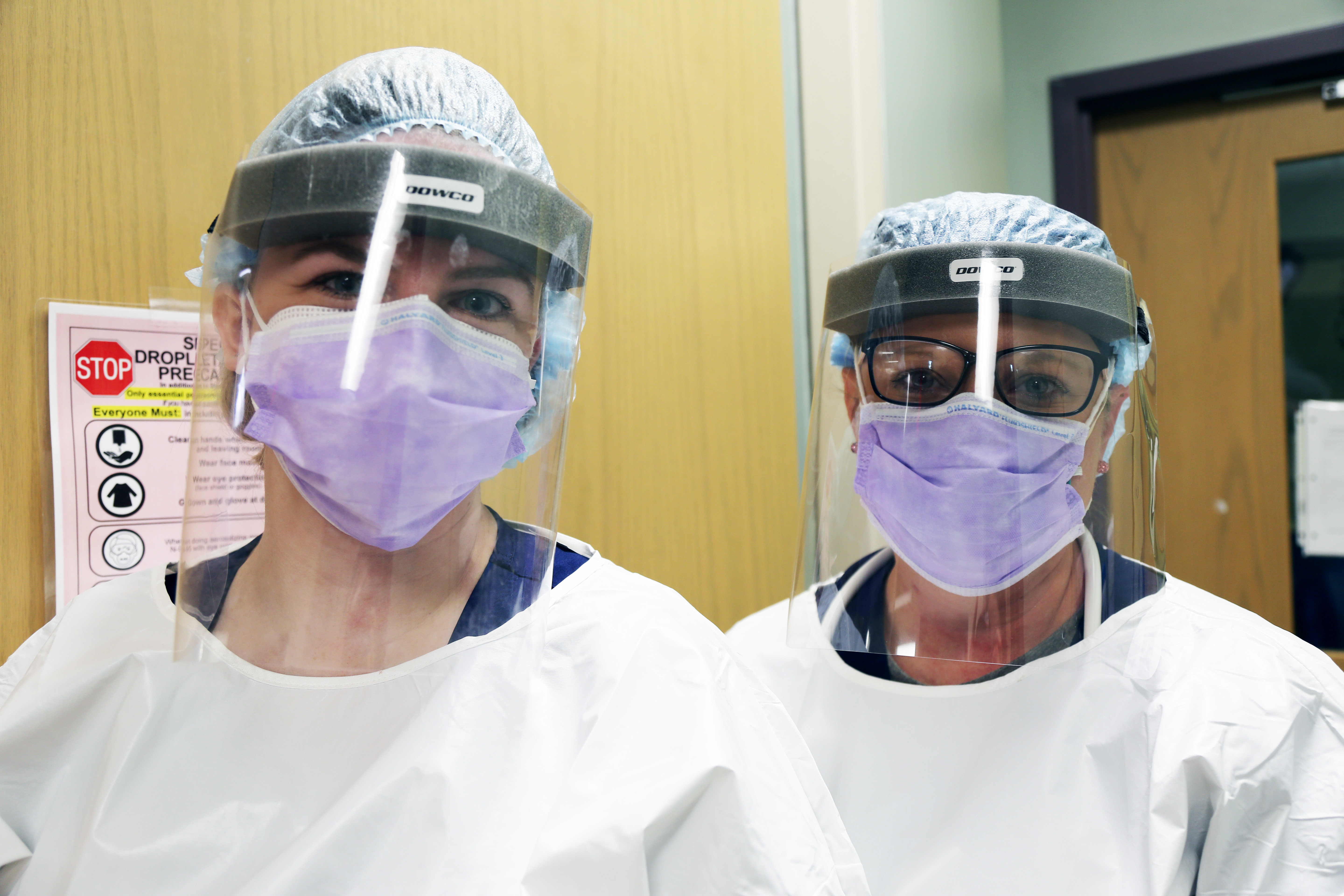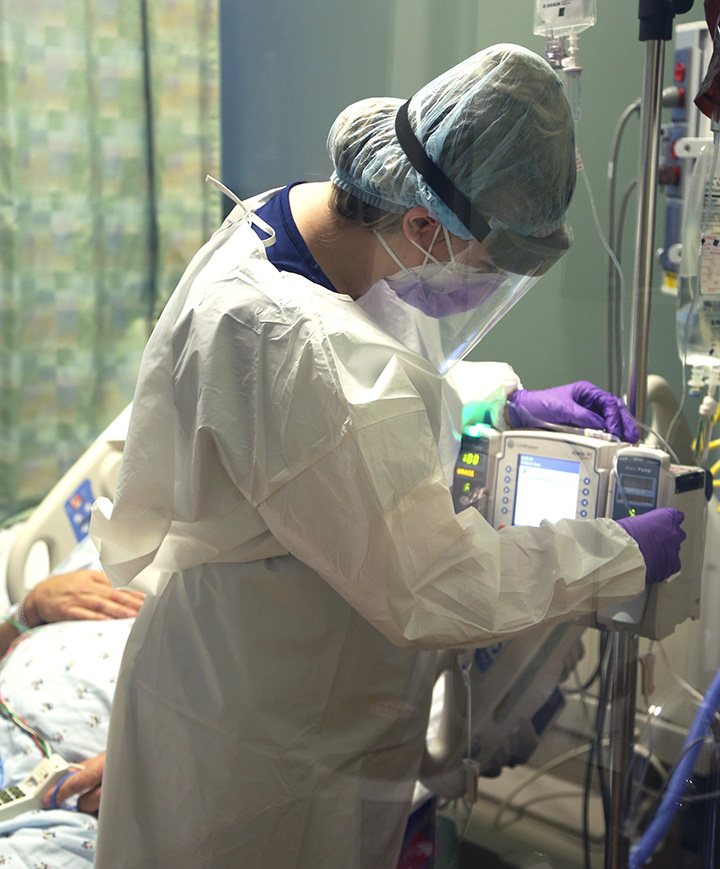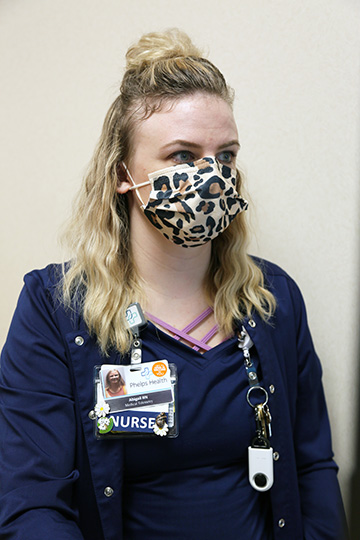
Published on September 14, 2021
Read Time: Four Minutes
At least once per shift, a person diagnosed with COVID-19 in Phelps Health’s Medical Telemetry Unit is transferred to the Intensive Care Unit (ICU).
“We are constantly sending them [patients] to the ICU, and we are not seeing them come back to our floor,” said Abigail Blanc, a registered nurse who has cared for COVID-19 patients for the last few months at Phelps Health.
She described the current COVID-19 situation at Phelps Health as “pretty bad right now.”
Rooms in the Medical Telemetry Unit, where Blanc works, are full with COVID-19 patients.
As of September 9, 2021, the average seven-day COVID-19 inpatient census at Phelps Health was about 20. That number was in the 30s in late July and early August 2021.
‘More Extensive Care’
Caring for COVID-19 patients has been completely different from dealing with patients that Blanc is used to seeing on her floor.
Nurses are having to check on patients more often because their oxygen levels are dropping.

“They need a lot more extensive care,” she said. “We're giving more IV antibiotics and more IV steroids than typical.”
Blanc recalled a 40-year-old COVID-19 patient who needed help to the bathroom. Before the patient had COVID-19, Blanc said the individual was completely independent and could do things like use the bathroom on their own.
Majority Are Unvaccinated
Since she began working in the COVID-19 unit at Phelps Health, Blanc said she has seen about four or five vaccinated patients, while the rest have been unvaccinated.
“We're seeing perfectly healthy, younger people [in their] 30s or 40s come in with COVID-19,” Blanc said. “They’re not vaccinated and not really taking precautions, and they're not doing well.”
During the month of August 2021, 86% of patients hospitalized at Phelps Health for COVID-19 were unvaccinated.
She noted that many of the patients who were hospitalized with COVID-19 do not want to get the vaccine even after they were sick.

Blanc encourages people to get the COVID-19 vaccine. She was diagnosed with COVID-19 and has since received the vaccine.
“I'm still scared that I'm going to end up with COVID-19 [again], but at least I won't end up as bad as these patients who are coming in, not vaccinated.”
Doing Everything They Can
During the month of July, a total of seven people died from COVID-19 at Phelps Health. In August, the number of COVID-19 deaths jumped to 25.
“We are tired of seeing people die every single day because of COVID-19,” Blanc said.
Each time a patient is transferred from her floor to the ICU, it weighs on Blanc and the other nurses and care staff.
“You've taken care of them for a few days and done everything you can,” she said.
She recalls looking into the eyes of her patients and seeing tears.
“And you're crying, too, because that is probably the last time you're going to see them, and…their family didn't get to come see [them] before because you had to rush [them] over to be intubated,” Blanc said.
Feeling Defeated
The longer the COVID-19 pandemic drags on, the more worry and stress that nurses face.
Because COVID-19 is so contagious, Phelps Health nurses and other employees caring for COVID-19 patients risk exposure every time they enter a patient’s room.
Those caring for COVID-19 patients must wear personal protective equipment, including gowns, masks, face shields, gloves and more, each time they enter rooms where the patients are isolated.
“You are constantly gowned up in these [isolation] rooms,” Blanc said. “You're trying to do as much as possible to reduce your risk of exposure with COVID-19…you're pouring sweat by the time you get out of the isolation room and hoping that you don't end up with COVID-19.”
Over the past few months, Blanc said she has noticed how the pandemic has led to a negative impact on her mental well-being.
“You feel defeated after every single shift, and you have to pull the courage to even come to work,” Blanc said. “It's been very difficult, and you think as a nurse, ‘how much longer can I do this?’”
What You Can Do
Getting vaccinated is the best way to slow the spread of COVID-19.
Talk to your healthcare provider about getting the COVID-19 vaccine. If you have questions or concerns, your doctor can help and offer you advice.
In addition, following other safety precautions, such social distancing, wearing a mask in public places and washing hands, can keep you and those you care about healthy.
For More Information
Learn more about COVID-19 vaccines.